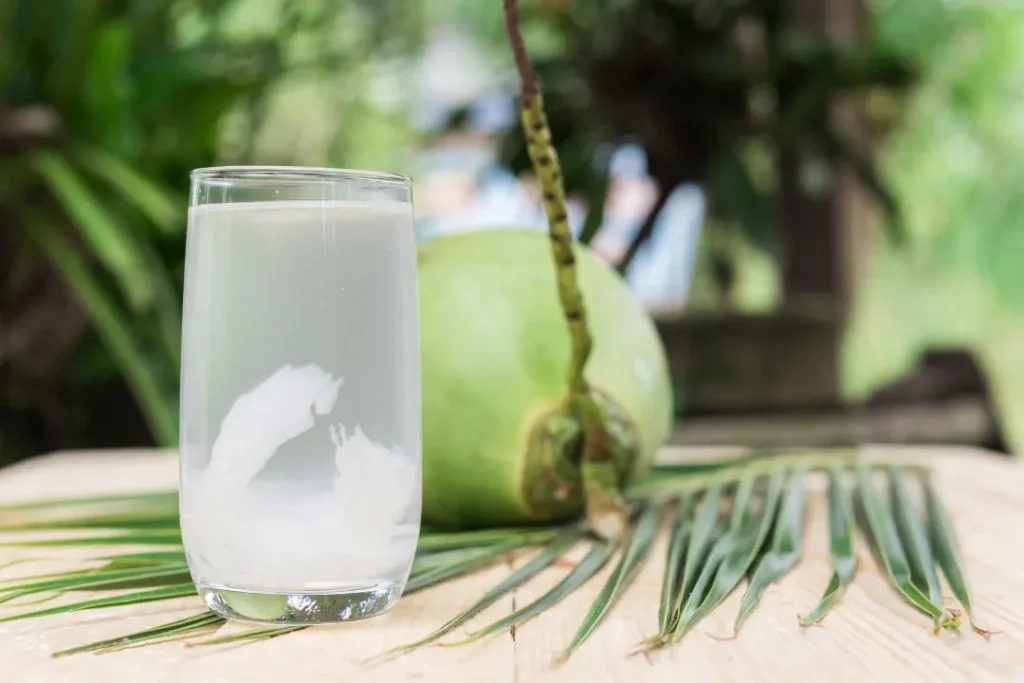Coconut water is the clear liquid found within young coconuts and is known for its refreshing taste and alleged health benefits. It has recently emerged as a popular natural beverage. This article looks into the scientific elements of this drink, its origins, health advantages, recommended dosage, side effects, potential interactions, and safe use.
You May Also Like:
Supplements For Sanity: Mushrooms For Mental Health
Cognitive Health Extra Strength Supplement vs Medicine Man Plant Co.’s The Brain Pill
The Nature of Coconut Water
Coconut water is a clean, isotonic fluid protected from light and air by a hard shell. Water, carbohydrates, vitamins, minerals, amino acids, cytokinins, and phytohormones make up this nutrient-dense liquid.
Electrolytes, such as sodium, potassium, calcium, magnesium, and phosphorus, are the most notable chemical constituents of coconut water. These minerals are necessary for the body’s fluid equilibrium as well as nerve and muscle function.
Health Benefits of Coconut Water
Coconut water is linked to a variety of health benefits, due to its high electrolyte and vitamin content.
Hydration: Because coconut water is an isotonic solution, its solute concentration is identical to that of the body’s cells, making it is useful for rehydration after physical exercise or illness.
Heart Health: Coconut water’s high potassium content can benefit cardiovascular health by lowering blood pressure and counteracting the sodium-induced rise in blood pressure.
Coconut water includes antioxidants, which aid in the neutralization of damaging reactive oxygen species in the body, reducing oxidative stress and potentially lowering the risk of chronic diseases.
Kidney Health: The potassium and magnesium content of coconut water can help the body to avoid kidney stones by lowering calcium oxalate crystallization.

Chemistry of Coconut Water
Water makes up around 95% of the overall content of coconut water. Sugars (such as glucose, fructose, and sucrose), electrolytes (potassium, salt, calcium, magnesium, and phosphorus), vitamins (particularly C and B), amino acids, and plant hormones known as cytokinins are the remaining ingredients.
Coconut water has a sweet taste becasue of the sugar content, and its rehydrating effects are because of the electrolytes. Cytokinins, particularly trans-zeatin, have been found to have anti-aging, anti-thrombotic, and anti-carcinogenic properties.
Physiological Properties of Coconut Water
Coconut water’s health advantages are linked to its unique chemistry, resulting in the following physiological responses:
- Hydration: Due to its isotonic nature and high electrolyte content, coconut water is an efficient rehydration agent. The electrolyte balance aids in the quick replenishment of fluids lost through sweating or illness.
- Heart Health: The high potassium content of coconut water contributes significantly to heart health. Potassium is an essential component in the transmission of electrical signals in the heart, which is required for a healthy heartbeat. It also helps to balance the effects of salt, which helps to regulate blood pressure.
- Antioxidant Properties: Ascorbic acid (vitamin C) and cytokinins are two antioxidant substances found in coconut water. These chemicals reduce oxidative stress and the risk of chronic illnesses by neutralizing reactive oxygen species in the body.
- Kidney Health: The potassium and magnesium included in coconut water may aid in the prevention of kidney stones. They act by binding with calcium and oxalate in the urine, reducing crystal formation and the formation of kidney stones.
Coconut water’s well-known health benefits, combined with its natural origins, make it an appealing beverage. However, scientific understanding of its physiological properties is still evolving, and more research is required to solidify its potential purposes in our health and illness treatment.


Optimal Dosage of Coconut Water
There are no formal recommendations on the best way to drink coconut water. However, because of its high potassium level, it is best to drink it in moderation. The Food and Nutrition Board recommends that adults take 4.7 grams of potassium daily. A 1-cup portion of coconut water contains around 600 milligrams of potassium.
Side Effects of Coconut Water
While it is generally safe for you to drink coconut water, excessive consumption can result in hyperkalemia (extra potassium in the blood), which can cause nausea, irregular pulse, and, in extreme circumstances, cardiac arrest. It’s also worth noting that coconut water contains a lot of natural sugar, so if you are a diabetic, you should drink it with caution.


Potential Substance Interactions with Coconut Water
There is currently little research on the potential drug interactions with coconut water. Due to its high potassium concentration, it can interact with potassium-sparing diuretics, potentially resulting in hyperkalemia. As a result, if you are using these medications, you should talk to your doctor before adding coconut water to your diet.
Responsible Use of Coconut Water
Coconut water’s health benefits make it an excellent addition to a well-balanced diet. However, you need to keep in mind that it is not a magical elixir and should still be consumed sensibly.
Because coconut water is a natural beverage, the vitamin content varies depending on the maturity of the coconut. As a result, reading the product labels is advised while consuming any packaged versions. Additionally, you should be mindful that flavored or sweetened versions may contain extra sugars and other ingredients.


Coconut Water: Conclusion
To summarize, coconut water is a delicious and nutritious natural beverage that provides man hydration benefits as well as benefits to your heart and kidney health. However, responsible intake is critical, especially if you have certain health issues. More research on its possible health advantages and interactions will surely yield more information.
References:
- Coconut Water: Far More than Just a Refreshing Beverage. Retrieved from:https://www.healthline.com/nutrition/8-coconut-water-benefits
- Potassium: Fact Sheet for Health Professionals. Retrieved fromshttps://ods.od.nih.gov/factsheets/Potassium-HealthProfessional/
- What are the Benefits of Coconut Water? Retrieved from:https://www.medicalnewstoday.com/articles/318394
Important Note: The information contained in this article is for general informational purposes only, and should not be construed as health or medical advice, nor is it intended to diagnose, prevent, treat, or cure any disease or health condition. Before embarking on any diet, fitness regimen, or program of nutritional supplementation, it is advisable to consult your healthcare professional in order to determine its safety and probable efficacy in terms of your individual state of health.
Regarding Nutritional Supplements Or Other Non-Prescription Health Products: If any nutritional supplements or other non-prescription health products are mentioned in the foregoing article, any claims or statements made about them have not been evaluated by the U.S. Food and Drug Administration, and such nutritional supplements or other health products are not intended to diagnose, treat, cure, or prevent any disease.
